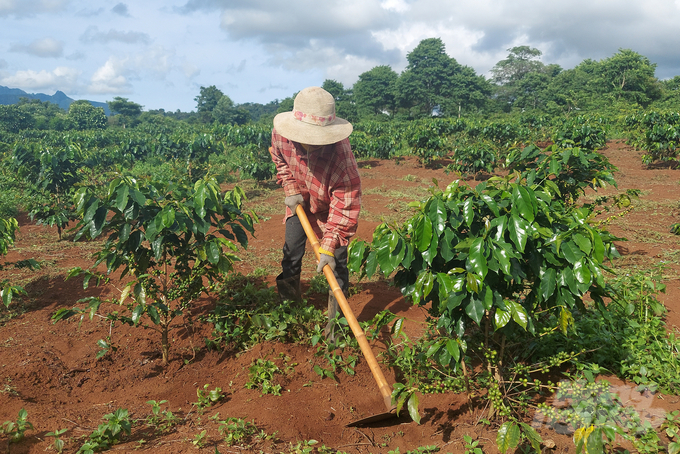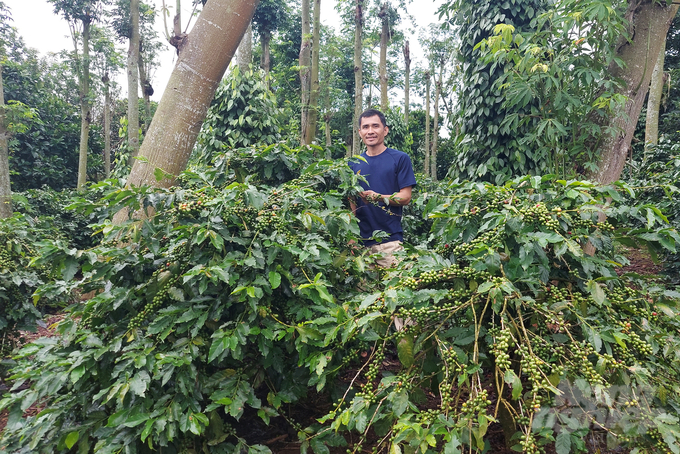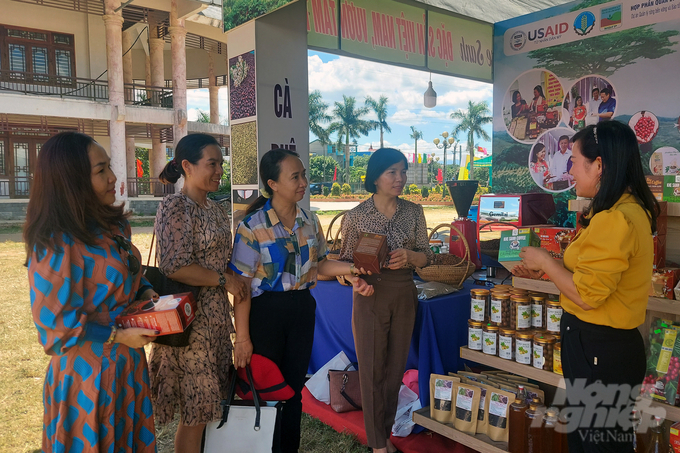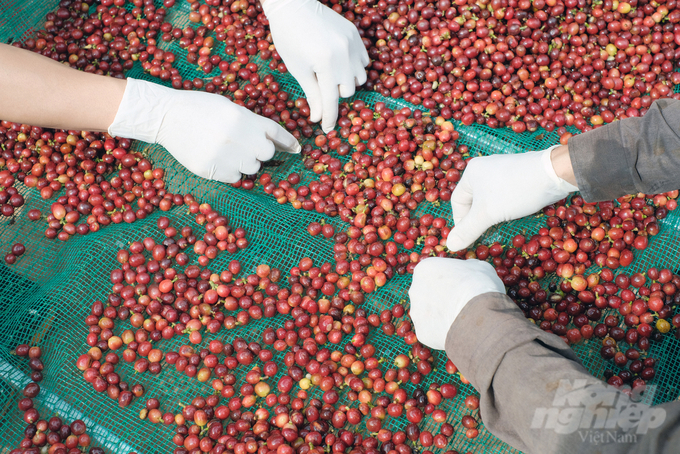May 17, 2025 | 20:37 GMT +7
May 17, 2025 | 20:37 GMT +7
Hotline: 0913.378.918
May 17, 2025 | 20:37 GMT +7
Hotline: 0913.378.918
In 1926, the French planted coffee in Quang Tri. By 1994, Arabica Catimor was grown in this land. Currently, Quang Tri has approximately 8,000 coffee-growing households with a total area of nearly 4,000 hectares, spanning over ten communes of Huong Hoa district, from the buffer zone of Bac Huong Hoa Nature Reserve Area – the bordering Huong Hoa Dakrong protection forest – to the buffer zone of Dakrong Nature Reserve.

Most of the current coffee area is cultivated in a monoculture method on a relatively high slope, which is not sustainable. Photo: Vo Dung.
The model of agroforestry coffee has emerged in this land as an inevitable response to the increasing market demands.
In 2020, Pun Coffee Co., Ltd cooperated with more than 100 households growing organic Abarica coffee (hand-picked when the fruit is ripe, planted underneath shade trees). The company purchased partially 300 tons of fresh coffee production to implement deep processing, finding a way to export coffee abroad under Pun Coffee.
“Shade trees are native fruit trees or wood trees that help people increase their income and profit from coffee production. We have provided farmers with various shade trees such as coffee jackfruit, avocado No. 034, and other timber trees. Thanks to shade trees, coffee gardens create landscapes and produce the best quality products. This is also a way for us to respond to the Government’s One Billion Trees Program, which is being implemented nationwide,” said Mr. Phan Hong Phong, technical officer of Pun Coffee Co., Ltd.
Thanks to the efforts of farmers, enterprises and cooperatives, in 2021, Khe Sanh Coffee won first place in the “Vietnamese specialty coffee” contest organized by the Buon Ma Thuot Coffee Association. In 2022, Khe Sanh Coffee again won the Silver Prize in the competition “Coffees Roasted at the Origin” for small producers and processors worldwide by the Agency for the Valorization of Agricultural Products held in Paris, France. Since then, Huong Hoa Arabica coffee has gradually contributed to the local and global coffee value chain.
Ms. Nguyen Hong Phuong, Deputy Director of the Quang Tri Department of Agriculture and Rural Development, states that coffee is a key crop and plays a strategic role in the socio-economic development in western Quang Tri, contributing to hunger eradication, poverty reduction, and progressing towards farmer empowerment, significantly benefiting ethnic minorities.

Pun Coffee is one of the leading enterprises in implementing agroforestry coffee cultivation. Photo: Vo Dung.
However, most of the current coffee area is cultivated by monoculture method on relatively high slopes. Though conventional, it is unsustainable and lacks an irrigation system, so the coffee yield is decreasing, significantly impacting the environment and people’s income. The application of new techniques is still limited. The increase in the aging coffee area affects coffee output and quality, reducing its market competitiveness.
The value chain of the commodity industry from production, purchasing, processing, preserving, and consuming products has not been closely connected. Different types of coffee production and business organizations reveal more weaknesses than strengths.
In June 2023, the World Wide Fund for Nature Vietnam (WWF Vietnam) sent an official dispatch to the People’s Committee of Quang Tri province. This document proposes implementing the “Agroforestry Coffee” project in the Huong Hoa district. The Danida Green Business Partnerships (via WWF Vietnam) hereby agrees to provide a non-refundable aid of 1.2 million USD for Quang Tri to implement the project “Agroforestry coffee” in Huong Hoa district.
Previously, in May 2022, WWF Vietnam conducted a feasibility study to build a project related to developing the Arabica coffee value chain in the Huong Hoa district. The results show that the Arabica coffee industry in Huong Hoa is full of potential, creating livelihoods for people, allowing for sustainable production, linking with export markets, and conserving biodiversity.

Products from agroforestry coffee are increasingly receiving the attention of consumers. Photo: Vo Dung.
This project is meaningful, aligning with the local planning to develop the value chain and sustainable coffee supply. Significantly, it contributes to the Government’s One Billion Trees Program.
Through a sustainable, high-quality, and forest-friendly coffee model, the project is expected to help improve the livelihoods of small-scale coffee producers in Huong Hoa district, reduce poverty, and effectively manage the area of natural forest connecting the biodiversity corridor between Bac Huong Hoa Nature Reserve and Dakrong Nature Reserve.
The project's target audience is Bru-Van Kieu ethnic group, which comprises small-scale production households struggling to make a living with an income 20% lower than the average in Vietnam 50%. The transformation to an agroforestry model will bring people sustainable and favorable livelihoods.
Slow Company is one of the two enterprises implementing the project to sell 1,000 tons of green coffee beans based on the agroforestry model and related standards and certifications. This project enables the transition from monoculture farming to an agroforestry model and increases household income. This partnership is in line with Denmark’s priorities in Vietnam.
The cooperation of stakeholders such as WWF Vietnam, Slow Company, and local authorities and people to implement the agroforestry model will improve the quality of the biodiversity corridor between the Dakrong Nature Reserve and Bac Huong Hoa Nature Reserve. As livelihoods improve, people will be motivated to participate in the protection of high-value protected areas that benefit the ecosystem. Slow Company will deduct a part of the profits from the coffee business to contribute financially to the conservation activities of WWF Vietnam in Quang Tri.
Regarding policy-making, the transition to an organic agroforestry model will support Vietnam’s national plan. The carbon sequestration could help Vietnam meet its nationally determined contributions to a 9% reduction in GHG emissions compared to the business-as-usual (BAU) scenario.
The project aims that 2027 Quang Tri will have 2,500 ha hectares of coffee from a monoculture to agroforestry farming model. Two thousand participating households will have a 40% increase in income. This result will help protect 18,000 hectares of natural forest in the biodiversity corridor between Bac Huong Hoa Nature Reserve and Dakrong Nature Reserve.

Agroforestry coffee reduces damage to forests, opening the opportunity for Vietnamese coffee products to reach the global market. Photo: Vo Dung.
WWF and Slow Company must work with smallholders and sign long-term offtake contracts with European partners to do this. The project will enhance the capacity of farmers to produce sustainable agroforestry coffee and organic farming. Coffee harvesting and processing will also be improved.
Reviewing WWF Vietnam’s proposal, the People’s Committee of Quang Tri province is directing departments and agencies to finalize project documents to agree with donors on how to organize the implementation.
Ms. Nguyen Hong Phuong, Deputy Director of Quang Tri Department of Agriculture and Rural Development, states: “The advantage of the project is that it will find a leading enterprise in the local chain to sign a long-term contract to consume high-quality agroforestry coffee. Then, from three to five years, this contract will enable a higher purchase price than conventional coffee production, and coffee growers’ income will increase by 40%.”
Quang Tri aims to maintain and stabilize 5,000 hectares of coffee cultivation area. By 2026, at least 1,000 hectares of coffee will be replanted, of which 50 hectares will be certified with organic standards and 60 hectares to be developed and grow specialty coffee and tea in Huong Phung commune, Huong Hoa district. By 2030, Quang Tri is determined to completely replant old coffee with high-quality tea varieties, ensuring technical standards. This is one of the ideal conditions for implementing the agroforestry coffee project in Quang Tri.
Translated by Quynh Chi

(VAN) Muong Nhe Nature Reserve hopes that being upgraded to a national park will lay the foundation for forest protection efforts to be carried out in a systematic, modern, and sustainable manner.
/2025/05/16/3923-2-171845_52.jpg)
(VAN) Lower costs, higher yields, and improved soil quality are outstanding benefits that soybeans bring when integrated into the crop rotation system.

(VAN) The 'For a Green National Environment' programme aims to promote a green lifestyle, support businesses in implementing ESG practices, and turn Net Zero commitments into concrete actions.

(VAN) Cold-barn systems efficiently manage environmental and temperature conditions, which aids in the prevention of respiratory diseases in pigs and protects them from the vectors that transmit African swine fevers.

(VAN) To tackle challenges, the project 'Addressing key technical bottlenecks in the grouper supply chain in Vietnam' has been underway since 2024.

(VAN) The project 'Disease-Resilient and Sustainable Cassava Production Systems in the Mekong Region', funded by the Australian Center for International Agricultural Research (ACIAR), is being implemented from 2024 to 2028.

(VAN) Data from 10,000 farming households will help professionalize production organization and support the implementation of the One Million Hectares Program for High-Quality, Low-Emission Rice Cultivation.